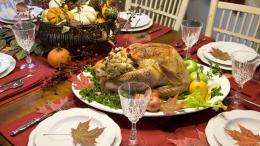Don't Blame Tryptophan for Thanksgiving Snooze

(PhysOrg.com) -- Blame it on the heavy meal, the alcohol, or simply the opportunity afforded by a free afternoon on a traditional holiday. Just don't blame it on the tryptophan, say experts at the University of Cincinnati.
They’re talking about the nap that often follows the traditional Thanksgiving meal of turkey and all the trimmings. Somehow it’s become ingrained in popular culture—with references everywhere from a “Seinfeld” episode to a “Jeopardy!” clue—that the tryptophan found in turkey triggers the drowsiness that leads to the holiday snooze.
Tryptophan is the precursor amino acid for the production of serotonin and melatonin, which are hormones known to promote sleep. But Stephen Benoit, PhD, an associate professor and obesity researcher in the psychiatry department at UC, points out that research linking tryptophan to sleep promotion involves extremely large doses of tryptophan and the absence of other nutrients.
“You’re talking about animals or patients who are basically food deprived,” he says. “Sure, if you feed them a lot of tryptophan, you can see some effect. But we don’t consume tryptophan in that large a quantity on Thanksgiving, and we don’t consume it in isolation.”
Benoit adds that the amount of tryptophan consumed in a serving or two of turkey, on average, is not significantly greater than the amount found in beef, fish and many other foods. It’s the meal as a whole—and the environment—that can be blamed for the urge to duck cleanup duties and take a nap.
“If you’re eating this large volume of food and calories and possibly consuming alcohol, that’s going to lead to sleepiness,” he says. “There are a lot of carbohydrates in the meal, a lot of sugar, some protein, a lot of fat. That volume of calories and all the carbohydrates drives insulin secretion, which leads to the post-prandial (after-meal) glucose dip. All of that combined with the blood diverted to the intestines for digestion can lead to sleepiness.”
Additionally, Benoit says, the often-frenetic holiday environment plays a role.
“The meal is usually a production, you’ve got family, friends and whatever other factors might be involved in the social interactions—it’s a stressful time. So after the meal, there could be a sense of relief, and people look forward to not doing anything. Everybody just wants to lie back and relax for a while.”
Tryptophan is available as a dietary supplement, but Benoit points out that amino acids are well regulated within the body.
“You can’t just supplement yourself with a single amino acid and expect it to have a profound effect,” he says.
Provided by University of Cincinnati (news : web)













